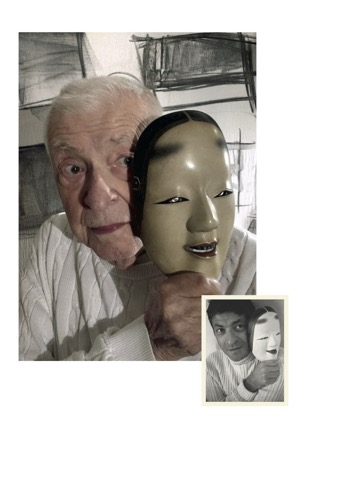About three months ago he was still busy working on the publication of his collection of short, haiku-type poems he had been writing incessantly for many years.
A month before his 92nd birthday on March 10, 2019 Andrzej Tadeusz Wirth, an unrivaled jester and punster, performed his ultimate joke and disappeared, yet he still waves to us from his poems, books, essays, and endless poses registered on hundreds of photographs, and in memories of his innumerable friends and former students scattered all around the world.
A characteristic, unforgettable figure, clad in white hat, and white linen suit, will no longer push his little stroller through the streets of Berlin’s Charlottenburg (sometimes too fast). But his white playful aura and his laughter will reverberate in all spaces devoted to experimental theatre and performance.
Andrzej T. Wirth, known as ATW, an acronym referring to (Angewandte Theaterwissenschaft) the Institute of Applied Theater Studies he started in Giessen in 1982, incessantly emphasized the ephemeral nature of theatre art and reenacted this ephemerality in his own life. He was everywhere as an inquisitive observer of the surrounding reality, reflecting and interacting with it: performativity was a stamp of his presence. In the preface to his book Teatr jaki mogłby być (Theatre: As It Could Be) published in Poland in 2002, Jan Kott wrote that “Andrzej Wirth has achieved one of the most difficult things: he performed Andrzej T. Wirth.”
Andrzej Wirth experienced Brecht’s theatre directly during his visits to the Berliner Ensemble in the 1950s. These visits left a deep imprint on his own view of theatre and his future work with his students. In the 1970s he started his very important work on Brecht’s Lehrstücke: The Measures Taken (Die Massnahme), and Fatzer Experiment. Together with Daniel Gerould he introduced experimental Polish theatre–the work of Stanislaw Ignacy Witkiewicz, Witold Gombrowicz, Sławomir Mrożek, and many others — to Western audiences.
His dedication to tracing novel forms of expression in the theatre manifests itself in his concept of theatre praxeology, which perceives theatre as a space for testing theory and practice. In his work with his students in the USA in the 1970s, he introduced the concept of the post-dramatic theatre, the term later proliferated by Hans-Thies Lehman.
As Lehman noted in the Afterward to Teatr jaki moglby byc, ATW had always been a kind of a “theatre detective” discovering new forms and tendencies in the theatre. In the 1990s he delved into another medium—film. Together with Thomas Martius he produced Las Venice (2000–2004) and, with Pawel Kocambasi, Theatre Without Audience (2016). Of course, performativity was at the core of these films, or rather, film essays, and ATW was the main performer.
All students, collaborators, and friends stress ATW’s sense of performativity, and his incomparable aesthetic radicalism. He was a charismatic, fatherly teacher, equipped with an unusual sense for tracing novelty and freshness in all possible manifestations of art, always willing to share his discoveries with his students and broad audiences.
We greatly miss him.

Andrzej T. Wirth.
Photo Credits: Top – Pawel Kocambasi; Bottom – Carol T. Washburn. Pairing of photos found at BFS16.

European Stages, vol. 13, no. 1 (Spring 2019)
Editorial Board:
Marvin Carlson, Senior Editor, Founder
Krystyna Illakowicz, Co-Editor
Dominika Laster, Co-Editor
Kalina Stefanova, Co-Editor
Editorial Staff:
Joanna Gurin, Managing Editor
Maria Litvan, Assistant Managing Editor
Advisory Board:
Joshua Abrams
Christopher Balme
Maria Delgado
Allen Kuharsky
Bryce Lease
Jennifer Parker-Starbuck
Magda Romańska
Laurence Senelick
Daniele Vianello
Phyllis Zatlin
Table of Contents:
- Introductory Note by Kalina Stefanova.
- “Andrzej Tadeusz Wirth (1927 – 2019) – White on White” by Krystyna Illakowicz.
- Lithuanian Marriage in Warsaw or The Last Production of the Great Eimuntas Nekrošius by Artur Duda.
- “My, Żydzi polscy [We, Polish Jews]”: A Review of Notes from Exile by Dominika Laster.
- A Report on the State of Our Society, According to Jiří Havelk in The Fellowship of Owners at VOSTO5, Prague, and Elites, at the Slovak National Theater, Bratislava by Jitka Šotkovská.
- About Life as Something We Borrow. On the Stages of Pilsen (In the 26 th edition of the International Theatre Festival There) by Kalina Stefanova.
- Redesigning Multiculturalism or Japanese Encounters in Sibiu, Romani, The Scarlet Princess, written and directed by Silviu Purcărete, inspired by Tsuruya Namboku IV’s Sakura Hime Azuma Bunshô by Ion M. Tomuș.
- About Globalization: A “Venice Merchant” on Wall Street, at the Hungarian Theatre of Cluj in Romania by Maria Zărnescu.
- The Patriots, Mary Stuart and Ivanov and the Rise of the Drama Ensemble of the National Theatre in Belgrade by Ksenija Radulović.
- The Unseen Theatre Company or How to See Beyond the Visible: The Shadow of My Soul and the Theatre of Velimir Velev by Gergana Traykova.
- Multilingual Pirandello, Understandable to Everyone: The Mountain Giants at the Croatian National Theatre “Ivan pl. Zajc”, Rijeka by Kim Cuculić.
- The return of the repressed: the ghosts of the past haunt Barcelona’s stages by Maria M. Delgado.
- A poetics of memory on the Madrid stage (2018) by Maria M. Delgado.
- The Danish National Theatre System and the Danish National School of Performing Arts: December in Copenhagen 2018 by Steve Earnest.
- Towards a Theatre of Monodrama in Turkey 1 by Eylem Ejder.
- Where Is Truth? Justiz by Friedrich Dürrenmatt, adapted and directed by Frank Castorf at the Schauspielhaus Zürich by Katrin Hilbe.
- Report from Vienna by Marvin Carlson.
www.EuropeanStages.org
europeanstages@gc.cuny.edu
Martin E. Segal Theatre Center:
Frank Hentschker, Executive Director
Marvin Carlson, Director of Publications
©2019 by Martin E. Segal Theatre Center
The Graduate Center CUNY Graduate Center
365 Fifth Avenue
New York NY 10016
European Stages is a publication of the Martin E. Segal Theatre Center ©2019
Martin E. Segal Theatre Center:
Frank Hentschker, Executive Director
Marvin Carlson, Director of Publications
©2019 by Martin E. Segal Theatre Center
The Graduate Center CUNY Graduate Center
365 Fifth Avenue
New York NY 10016
European Stages is a publication of the Martin E. Segal Theatre Center ©2019



